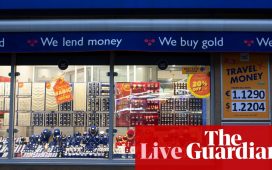The buy now, pay later company Klarna has logged its first quarterly profit in four years, improving its fortunes in the run-up to a potential $15bn (£12bn) stock market flotation and a regulatory crackdown under a possible Labour government.
The Swedish firm, which is the biggest BNPL provider in Britain and has about 150 million international customers, said on Monday that it had swung to a profit of 130m Swedish kronor (£9.6m) in the July to September quarter, marking a notable bounce from a 2bn kronor loss during the same period last year.
It follows a tough period for Klarna, which suffered a 85% drop in its market valuation from $45.6bn to $6.7bn last year, and cut about 10% of its global workforce.
The fintech company, which now employs about 5,000 staff, also narrowly avoided an employee strike this week, after it bowed to demands by workers attempting to unionise and strike a collective bargaining agreement.
Its growing pains are being closely scrutinised as it lays the groundwork for a market flotation that could value the company at $15bn. That has involved setting up a new British holding company, which would allow it to list on a stock exchange more easily.
The BNPL lender’s first profits since 2019 were driven by a 30% jump in revenue, as well as an increase in customers meeting their payment deadlines as Klarna became more discerning on who it lent to and how much they were able borrow against their purchases.
Credit losses, Klarna said, dropped by 56% “due to continuous improvements in underwriting precision and accuracy ensuring Klarna continues to make the right lending decisions for consumers”.
A Klarna spokesperson said that setting up the UK legal entity was an “important early step on a journey towards an eventual IPO”. However, there is still no guarantee that the firm will float in the UK, which is Klarna’s third largest market, behind Germany and the US.
“This is an administrative change that has been in the works for over 12 months and does not affect anyone’s roles, nor Klarna’s Swedish operations,” the spokesperson said.
However, the company is also facing a potential crackdown in the UK, where the Labour party, which is well ahead in the polls, has said it wants to give BNPL users the same protection as credit card borrowers.
The shadow City minister, Tulip Siddiq, outlined Labour’s demands in a letter to the Treasury, saying they expected customers to be given clear and accurate information about what terms they were signing up to, and should be able to take complaints to the financial ombudsman.
BNPL companies such as Klarna – which allow customers to stagger or delay payments – enjoyed explosive growth in recent years, particularly in the wake of the pandemic-fuelled online shopping boom.
after newsletter promotion
Although BNPL firms usually make their money by charging commission to retailers rather than customers, they have been accused of creating mounting debt piles for cash-strapped borrowers.
Last week, the Financial Conduct Authority said there had had been a “significant increase” in the use of BNPL, with 27% of UK adults – about 14 million people – turning to it at least once in the six months to January this year. This was up from the 17% who said they had used it in the preceding 12 months in May 2022.
The research also found that frequent users of BNPL were “more likely to be in financial difficulty”.
A Klarna spokesperson said: “We have supported BNPL regs for a long time, ensuring clear info, protection from bad actors and access to zero-cost credit. We’re pleased to see these principles outlined in Ms Siddiq’s letter.”








